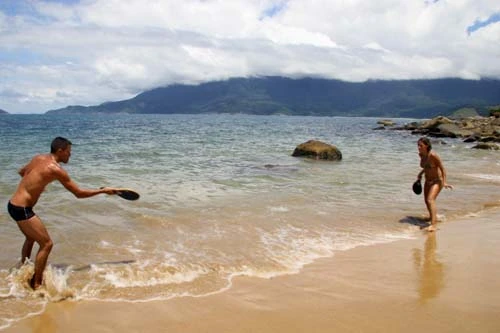The Beaches Of Brazil – Some Portuguese Vocabulary
Brazilians are very serious about their beaches, partially because they have so many beautiful ones to choose from. From Amapa to Rio Grande do Sul, there are thousands of miles of coastline. I have visited so many stunningly beautiful beaches in Brazil, but still have many left to see, including those on Fernando de Noronha island, rumored to be the best in the country. I have so many favorites it’s impossible to chose, but I think some of the best states to beach hop in are Rio de Janeiro, Santa Catarina, and Bahia.

Fernando de Noronha island, brazil
a praia – the beach
a barraca de praia – beach hut, cabana
a cadeira de praia – beach chair
a casa de praia – beach house
o guarda-sol – umbrella
o biquini – bikini
maiô – bathing suit
a bermuda – swimming shorts for guys
a sunga – men’s speedo
a duna – sand dune
o salva-vidas – lifeguard
a areia – sand
o castelo de areia – sand castle
o mar – ocean
a onda – wave
o tubarão – shark
o sol – sun

the famous beaches of rio de janeiro
os óculos (de sol) – sunglasses
o protetor solar – sunscreen / sun block
o isopor – a cooler (made of styrafome)
mergulhar – to go under water / to dive
nadar – to swim
boiar – to float
“tomar um banho de sol” – to sunbathe
bronzear – to tan
queimar – to get tan / burn
canga – sarong
festa na praia – beach party

festa na praia
Portuguese Beach Slang
“farofeiro” – this is a slang word used for sort of a low income tourist from the interior who goes to the beach for a day trip, suually they come in groups by bus or van. They come bringing everything they need to survive on the beach for a day, usually large quantities of food (including a bag filled with farofa), drinks and clothes, so that they do not have to spend any money.
“pegar um bronze” – slang for the verb “se bronzear”
Examples:
“nossa! hoje só tem farofeiro na praia.” – “Jesus! today there’s only farofeiros on the beach”
“domingo vamos fazer uma fartofada na praia o Morra em Guarapari”
Portuguese Beach Expressions
“rato de praia” – you know those types of people who like to go to the beach every day, and stay there all day. In Brazil we call them “ratos de praia,” sort of like a “beach bum.”
“amor de praia não sobe a serra” – this is a common Brazilian expression literally saying “beach love doesn’t go up the mountain” it’s meaning is along the lines of: “summer love doesn´t last.”
“nadar, nadar e morrer na praia” – this expression is said of someone who worked their fingers to the bone, almost succeeded, yet was defeated just as they were about to see victory .” Those who are unlucky enough to be shipwrecked (naufregar) – they may “swim, swim, swim” to the shore, only to “die on the beach.” The expression in Brazil is frequently used to talk about soccer teams (the archetypical example for American sports teams would be the Boston Red Sox).
“não é a minha praia” – this one has nothing to do with the beach. it means: “it’s not my cup of tea”
“tirar onda” – this is a great portuguese slang expression, which means “to show off.” For example: “Peguei o carro do meu tio emprestado e fui tirar onda na avenida com os amigos.” – “I borrowed my uncle’s car and went to show it off in the street with my friends.”
Types of Beaches
Though Brazil is a highly stratified society, one thing Brazilians pride themselves on is the democracy of their beaches. Unlike other locations like restaurants, clubs, and stores, the beaches are open to all, and all beaches in Brazil are considered public. The beach is supposedly a place where people of any social class can feel welcome.
Just as a side note, although Cariocas of all social classes feel comfotable at the beach, they usually go to specific beaches and sometimes even specific points on the beach. In Ipanema, for example, Posto 9 is known for being the spot for the young and wealthy, while farther down the beach in Arpoador, the crowd is mostly working class.
So, this was the only vocab word that i could think of for this section:
praia de nudismo – nudist beach
…i accidentally walked into one of these when i was in Florianopolis. There are many.
Beach Games In Brazil
altinha – stand in a circle and keep a soccer ball off of the ground, using everything but your hands…i wrote a whole post about this Here
frescobol – this beach paddle ball game played with small ping-pong-like rackets is a very popular activity on the beach in brazil (it’s “the #1 sport played on the beaches throughout Brazil,” according to frescobol.com)

frescobol

futevôlei – beach volleyball with no hands
“bater uma pelada” – slang, for playing soccer on the beach
fazer parapente, voar de asa-delta – to go hanggliding, parasailing (parapente is a parasail)
Also…
Click Here for portuguese surfing vocab
Click Here for a list of aquatic animals in portuguese


















